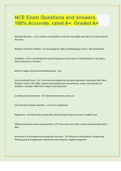-
1. Examen - Nce and cpce study guide questions with accurate answers, rated a+
-
2. Examen - Nce/cpce exam top-notch study guide, questions coverage with accurate answers, rated ...
-
3. Examen - Helwig nce & cpce prep (hgrd). top exam questions and answers, 100% accurate, graded...
-
4. Examen - Nce and cpce top exam questions with accurate answers, rated a+
-
5. Examen - Nce and cpce: social and cultural foundations. top exam questions with accurate answe...
-
6. Examen - Cpce/nce exam. jmayy, exam questions with accurate answers, rated a+
-
7. Examen - Nce + cpce questions test bank. all examinable questions with accurate answers. 100% ...
-
8. Examen - Nce/cpce--group counseling and assessment questions with accurate answers, 100% accur...
-
9. Examen - Nce & cpce multiple choice chapters 3, 6, 7, & 8. all examinable questions with accur...
-
10. Examen - Nce-cpce practice exam #1, top exam question with accurate answers, rated a+
-
11. Examen - Nce / cpce study sets questions prepping. rated a+. verified.
-
12. Examen - Cpce/nce theorists, all covered. 100% accurate. verified.
-
13. Examen - Cpce/nce exam prep, question sections coverage, graded a+, latest update.
-
14. Examen - Nce/cpce terms - lifestyle and career development, questions sections with accurate a...
-
15. Examen - Nce/cpce test bank top exam questions with accurate answers, 100% accurate, rated a+
-
16. Examen - Cpce + nce career development, top question & answers, rated a+. 100% accurate.
-
17. Examen - Cpce/nce - career counseling, questions and answers, 100% accurate, rated a+
-
18. Examen - Nce exam questions and answers, 100% accurate, rated a+. graded a+
-
19. Examen - Practice exam 1 (nce), top exam exam questions and answers, 100% accurate.
-
20. Examen - Nce practice test questions and answers with rationale, 100% accurate, rated a+
-
21. Examen - Nce/lpc exam study guide, questions and answers, 100% accurate, rated a+
-
22. Examen - Nce study guide, questions and answers, 100% accurate, rated a+
-
23. Examen - Nce study guide (rosenthal), questions with answers, rated a+. 100% a+
-
24. Examen - Nce practice test questions, questions and answers, rated a+. graded a+
-
25. Examen - Nce national counseling exam questions and answers, 100% accurate, rated a+
-
26. Examen - Nce exam review questions & answers, 100% accurate, graded a+.
-
27. Examen - Nce practice exam top questions with accurate answers, 100% accurate.
-
28. Examen - Nce career counseling, questions & answers, 100% accurate, rated a+
-
29. Examen - Nce and cpce study guide questions and answers, 100% accurate. verified.
-
30. Examen - Nce study guide questions and answers, 100% accurate, rated a+
-
31. Examen - Nce exam – appraisal top exam questions and answers, 100% accurate, rated a
-
32. Examen - Nce: research and program evaluation. pilot study preparation, questions & answers, r...
-
33. Examen - Nce ethics, questions & answers, 100% accurate, rated a+
-
34. Examen - Chim nce practice exam 1 top questions with accurate answers. rated a+
-
35. Examen - Nce exam: lifestyle and career development. top exam questions with accurate answers,...
-
36. Examen - Nce exam theory, top questions and answers, 100% accurate. verified
-
37. Examen - Nce assessment & testing practice questions & answers, latest update. verified.
-
38. Examen - Nce: theories & theorists. full coverage, latest update. rated a+
-
39. Examen - Nce exam: professional orientation and ethics, top exam questions (answered), rated a...
-
40. Examen - Nce exam - professional orientation and ethics. questions and answers, 100% accurate,...
-
41. Examen - Nce exam - counseling and helping relationship. questions with accurate answers, 100%...
-
42. Examen - Nce exam (counseling theories). top exam questions and answers, 100% accurate.
-
43. Examen - Nce and cpce study guide questions and answers. 100% accurate, graded a+
-
44. Examen - Nce and cpce study guide, questions and answers, 100% accurate. graded a+
-
45. Examen - Nce and cpce study guide, questions and answers, 100% accurate. graded a+
-
46. Examen - Nce practice test #6 health information science practice questions and answers, rated...
-
47. Examen - Chime nce practice exam 1 top questions with accurate answers, rated a+
-
Montrer plus




